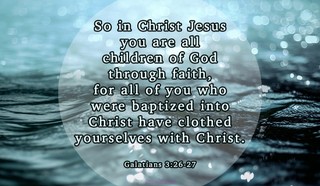
- Recent Translations
- All Translations
Kehillah in Galatia 3:14
Share
Settings
Images for Kehillah in Galatia 3:14

Kehillah in Galatia 3:14 Meaning and Commentary
That the blessing of Abraham
The same blessing Abraham enjoyed, even justification by the righteousness of Christ; and what was promised to Abraham, that in him, his seed, that is Christ, the Gentiles should be blessed, or justified; for though this blessing may in general comprise every spiritual blessing, yet it chiefly regards that of justification; or a deliverance from the curse of the law, and which is the end of Christ's being made a curse, that this blessedness
might come on the Gentiles;
the uncircumcision, as well as the circumcision; see ( Romans 4:9 ) that is, upon as many of them as were ordained unto eternal life, and in consequence of that believe in Christ; quite contrary to a Jewish notion, that
``no blessing dwells but upon an Israelite F1:''now though this blessing, as all other spiritual ones, were laid up in the covenant of grace, put into the hands of Christ, and God's elect blessed therewith, as considered in him, yet the curse of the law for their transgressions stood in the way of their personal enjoyment of it, to their peace and comfort in their own souls; wherefore Christ is made a curse for them, to make way for the blessing to take place upon them; which is by an act of God's grace imputed to them, and is received by faith:
through Jesus Christ;
or "in Jesus Christ", as the words may be read; meaning either, that this blessing comes upon the Gentiles that were in Christ, chosen in him, in union with him, and represented by him, both in the covenant and on the cross; or else that Christ is the Mediator, as from whom, so through whom, this, as every blessing of grace, comes to the children of God:
that we might receive the promise of the Spirit through faith;
Beza puts the copulative and to this clause, reading it, "and that we", &c. as does the Ethiopic version; thereby more clearly pointing out this to be another end of Christ's being made a curse for us: by "the promise of the Spirit" may be meant, either by an "hypallage", the Spirit of promise, who opens and applies the promises; or the Spirit promised, not as a spirit of regeneration, conversion, and faith; for, as such, he cannot be received by faith; Since, antecedent to his being so, there can be no faith; but rather as a spirit of adoption, in respect to which he is said to be received, ( Romans 8:15 ) and this blessing of adoption, as in consequence of redemption from under the law, its curse and condemnation, ( Galatians 4:4-6 ) . Or else a spiritual promise, in distinction from the temporal promise of the land of Canaan, made to Abraham and his natural seed, and means the promise of eternal life and happiness in the world to come; which promise is now received by faith, and that in consequence of the sufferings and death of Christ the testator; see ( Hebrews 9:15 ) .
F1 Zohar in Exod. fol. 51. 3.
